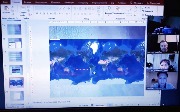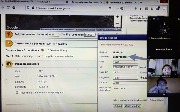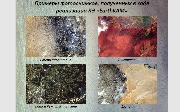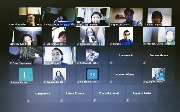MAI engaged the schoolchildren in the remote photo shoot of the Earth from the board of the International Space Station
On 10-13 of November the RISKSAT interregional project group consisting of 20 schoolchildren and 15 teachers from 10 regions of Russia took part in the 72nd online session of the international cosmic educational EarthKAM experiment, Roscosmos being the co-organizer of it. The Moscow Aviation Institute (National Research University) leads the experiment in Russia with the support of the Central Research Institute for Machine Building and S.P. Korolev Rocket and Space Corporation Energia.
EarthKAM is the only program granting the schoolchildren and the students the direct control over the equipment located at the orbit aimed at Earth photo shooting. Responding to the requests of the schoolchildren and students from the International Space Station board the high resolution pictures of the Earth are taken. The goal of the experiment is to increase motivation of the students for scientific research and also to increase the quality of the educational activity in general, and expanding of the opportunities of learning process organization via the usage of the photo materials received from the station. That is how kids study the ecology, the geography and the aerospace communication systems.
On the 28th of October 2013 the NASA-Roscosmos Minutes on joint activity within the framework of the EarthKAM experiment was signed. In July 2015 the EarthKAM was included to the long-term program of the applied scientific research and experiments on the ISS. Moscow Aviation Institute became the principal investigator representing Russia.
"While participating in the EarthKAM experiment the students from all over the world have the opportunity to manage the ISS on-board camera remotely. They choose the regions they are most interested in via the Internet, they send their requests to the ISS and under the special purpose computer control the camera carries out the shooting of the required areas and transmits the pictures to Earth. The received material is unique and it might be used for the educational process or individually" — says the technical science candidate, associate professor and general director of RISKSAT and the research advisor of the interregional project RISKSAT group Alexey Kucheyko.
At the first stage of the educational session Alexey Kucheyko conducted the cycle of lectures concerning the basic principles of the remote probing, and within the course the students discovered for themselves the arrangement and the working principles of the ISS, where the camera is situated, what are the procedure of the order, equipment programming and the satellite shooting like.
At the second stage Russian schoolchildren chose the necessary revolutions of the station for the shooting in Southern hemisphere — they were looking for the soot from the fires in Australia, for the Namib desert in the South-West of Africa. Their requests were delivered to the ISS digital camera control system. The camera made the corresponding pictures automatically and transmitted them back to the station computer for further uploading to the project site. As the result the participants received and processed three pictures.
"I would like to express my gratitude to the Director of the MAI InstituteNo. 6 „Aerospace“ Olga Tushavina for the invitation to take part in the project. We have been carrying out the project activity for space shoots for quite a long period of time already. Children know where the pictures are stored and how to take them from the archive. Till this moment they didn’t know how to get them. They managed to find the area of the photo shoot, to determine the focus point, to form and to carry out the transfer of the program file." — says Alexey.
The project group is planning to take part in the 73rd session which is to take place in the beginning of 2021.
"We would like to make a list of areas we are interested in from the point of view of further projects. The Far East, Baikal, Altay, Caucasus and so on." — notes Kucheyko.



